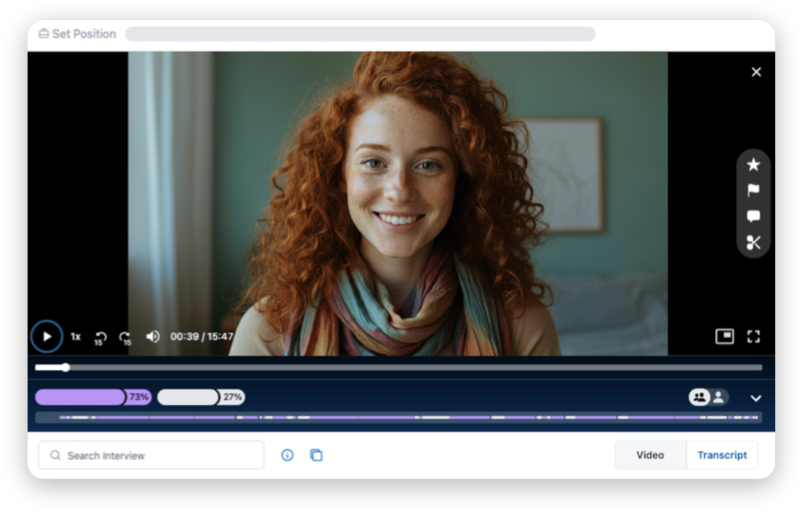Talent acquisition isn’t just about filling immediate vacancies; it involves strategically identifying, attracting, hiring, and retaining top talent to meet your company’s long-term goals. Talent acquisition specialists are at the heart of hiring for long-term success, helping employers build a workforce that supports future growth and innovation while meeting current demands.
To help you better understand the vital role talent acquisition plays in your business, this article examines a talent acquisition specialist’s job in more detail, including the key responsibilities and skills associated with the role. It also explains the difference between talent acquisition and recruitment and outlines the three main types of talent acquisition roles.
What Does a Talent Acquisition Specialist Do?
A talent acquisition specialist works to find the best talent available for an employer and fosters relationships with these potential candidates, building a pipeline for future hiring. In other words, talent acquisition specialists are proactively involved in aligning hiring practices with a company’s long-term objectives. This differs from traditional recruiters, who often only find candidates for immediate job openings.
Talent acquisition specialists are responsible for overseeing the entire recruitment process from start to finish, commonly known as full-cycle recruiting. The stages of the recruitment process include the following:
1. Sourcing Candidates
Talent acquisition specialists leverage various channels and resources, such as recruitment agencies, online job boards, and social media platforms, to find qualified candidates. This may also include attending job fairs and other recruitment events. Many employ AI-driven tools to accelerate the process and find suitable candidates quickly.
2. Screening
After identifying potential candidates, the talent acquisition specialist conducts basic candidate screening to determine cultural fit. They also evaluate whether or not prospective employees meet the job requirements. During this stage, the specialist might also suggest implementing alternative techniques and processes, such as candidate video screenings.
3. Selection and Interviews
The talent acquisition specialist works closely with the employer’s human resources department and hiring managers to determine the selection criteria for the ideal candidate. They help to refine the selection process, make hiring decisions, and negotiate offers. They might also have a hand in succession planning at this stage if they are working to fill senior roles.
4. Employer Branding Initiatives
Part of a talent acquisition specialist’s job involves building a strong employer brand. This entails representing the company at recruitment events like career fairs, maintaining a visible presence on social media, producing and uploading content to these social platforms, and ensuring a positive candidate experience on the whole.
5. Pipeline Development
One of the biggest benefits talent acquisition specialists offer companies is their ability to foster relationships with candidates for future hiring. They monitor the job market closely, actively participate on social platforms like LinkedIn, and build connections to develop a strong talent pipeline, even when there are no immediate vacancies.
Essential Skills for Talent Acquisition Specialists
Being a qualified talent acquisition specialist requires a very particular skill set. For example:
1. Knowledge of Sourcing Strategies and Industry Trends
Talent acquisition specialists must have a comprehensive understanding of the job market. This includes staying up-to-date with industry trends, especially in fields such as technology, healthcare, and aerospace and defense.
Additionally, specialists must know how to devise and implement sourcing strategies to attract talent in a competitive market. These include facilitating employer branding initiatives, cultivating strategic partnerships, and leveraging AI tools to automate candidate searches.
2. IT Skills and an Understanding of Applicant Tracking Systems (ATS)
Applicant tracking systems (ATS) help throughout the recruitment process to manage candidate data. Talent acquisition specialists must know how to leverage ATS tools for tracking candidate progress and identifying qualified applicants who align with the organization’s staffing needs and culture.
3. Interpersonal Skills
Having excellent interpersonal skills is essential for building relationships with potential candidates and internal teams.
4. Organizational Skills
Talent acquisition specialists are in charge of managing many moving parts, including meetings, interviews, and job postings. Having excellent organizational abilities is, therefore, critical to ensure the recruitment process runs as smoothly as possible.
5. Communication Skills
Excellent communication skills are vital for talent acquisition specialists to do their jobs effectively. These abilities are especially important for interviewing potential hires, negotiating with a hiring manager or executive team, and building an employer brand on social media.
Talent Acquisition Specialist Vs Recruiter
Although “talent acquisition specialist” and “recruiter” are often used synonymously, they differ significantly in terms of their objectives, scope, and approach.
Talent acquisition focuses on long-term strategic planning for future hiring needs. It takes a proactive approach that builds pipelines, networks, and relationships before new hires are even needed. As a result, talent acquisition specialists are often engaged in staffing specialized, senior, or executive-level roles that require specific skill sets. They also frequently collaborate with higher-level stakeholders to align hiring processes with a business’s growth trajectory and future needs. Additionally, a talent acquisition specialist’s work extends to employer branding, succession planning, workforce planning, and market trend analysis.
Recruitment, on the other hand, is often short-term and reactive, with recruiters sourcing candidates as job opportunities become available. This makes it more of a transactional engagement in which the recruiter’s relationship with candidates is confined to the hiring process. A recruiter helps minimize disruptions to business operations by filling roles quickly and efficiently, maintaining operational capacity. As such, they typically handle generic or high-turnover roles.
Types of Talent Acquisition Roles
Talent acquisition encompasses a variety of roles, with each addressing different organizational needs. Here is a breakdown of the three main types:
Head of Talent Acquisition
A head of talent acquisition’s job involves coordinating all recruitment, sourcing, and employer branding efforts across the organization. Their primary duties include using data analytics to improve hiring strategies, developing programs to improve employee retention and learning, and managing the talent acquisition department.
Talent Acquisition Manager
These individuals are responsible for overseeing the talent acquisition team, developing recruitment strategies, and ensuring hiring practices align with organizational goals. They design employer branding initiatives, attend job fairs, analyze staffing needs, and ensure the candidate experience is positive.
Talent Acquisition Specialist
These professionals handle the full recruitment process, from creating job descriptions and interviewing candidates to managing the administrative tasks associated with hiring. They work alongside hiring managers to ensure organizational needs are met.
Closing Thoughts
Talent acquisition specialists assist organizations in achieving long-term success by securing the best talent for their teams. These professionals play an important role in a company’s recruitment strategy, helping them build talent pipelines for filling future vacancies.
Through their hands-on experience in all aspects of full-cycle recruiting, including career fairs, interview techniques, and employer branding initiatives, talent acquisition specialists ensure companies stay ahead of the competition and are equipped to evolve with the times.
Frequently Asked Questions (FAQs)
What Does a Talent Acquisition Specialist Do?
A talent acquisition specialist is an HR professional who finds and attracts qualified candidates for an organization’s current and future job vacancies. They oversee the entire hiring process, from sourcing candidates to onboarding them, ensuring a positive experience for candidates.
Is a Talent Acquisition Specialist a Recruiter?
While a talent acquisition specialist’s job involves recruitment, their focus is on addressing an organization’s long-term human resources needs. Conversely, recruiters typically work to fill immediate hiring demands.
What Skills Do You Need to be a Talent Acquisition Specialist?
First and foremost, you need strong people skills to be a successful talent acquisition specialist. This includes excellent verbal and written communication skills and the ability to work in a team. You’ll also need to be well-organized and capable of working in a fast-paced environment. Familiarity with applicant tracking systems and social media, and a bachelor’s degree in human resources management or another relevant field like business administration or communications, is also recommended.
How Much do Talent Acquisition Specialists Make in the US?
Salary ranges for talent acquisition specialists in the United States fall between $50,000 and $85,000 per annum. These amounts are influenced by factors such as experience, industry, location, and the seniority of the role.










